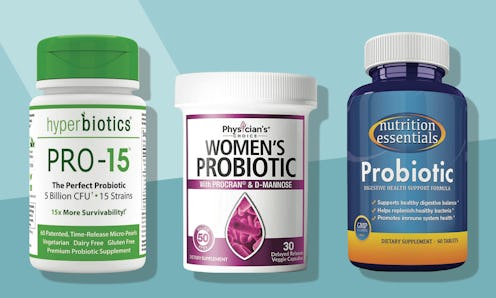
Probiotics are health-promoting bacteria that can improve not just gut conditions (where the vast majority of probiotic research has been focused), but skin conditions, too — including rosacea. To find out more about how probiotics work in relation to skin health — and to narrow down the best probiotics for rosacea, specifically — I got in touch with Dr. Whitney Bowe, M.D., a New York-based dermatologist and author of The Beauty of Dirty Skin: The Surprising Science of Looking and Feeling Radiant from the Inside Out.
According to Dr. Bowe, a compromised gut “can allow bad bacteria to ‘leak’ out of your intestines and to then travel throughout your body via your bloodstream. Your immune system marks these foreign substances as threats and therefore attacks them. This, in turn, gives rise to many substantial health issues. You can also have ‘leaky’ skin. When your skin microbiome is off balance, meaning that the healthy balance of good bacteria on your skin is not intact, this can compromise your skin’s natural barrier. This leads to inflammation, and chronic skin conditions," including rosacea.
In other words, focusing on improving your gut health can have a major impact on your skin. Skin-benefiting probiotics are often found in fermented foods and beverages, like yogurt, sauerkraut, kimchi, and kombucha. “Upon ingestion, they help preserve the gut lining, balance the body’s pH, regulate immunity, act as natural antibiotics, control inflammation, and more," Dr. Bowe explains. And though Dr. Bowe believes it's best to consume probiotics through these wholly natural sources, oral probiotic supplements can also help. These supplements aim to promote gut and skin health by regulating our immune system, fighting off bad bacteria, and preventing the interrelated conditions of a leaky gut and leaky skin.
If you're dealing with rosacea, below are three of the best probiotic supplements to try that might be able to help. And if your interest has been piqued by this topic, check out this guide to the best skin care products with probiotics.
We only recommend products we love and that we think you will, too. We may receive a portion of sales from products purchased from this article, which was written by our Commerce team.
1The Overall Best Probiotic For Rosacea
These Nutrition Essentials Probiotics contain two strains of probiotics: bacillus coagulans, which, according to Dr. Bowe, "Has been shown to have positive effects on immune function to the extent that it may reduce the production of free radicals," as well as acidophilus, which can improve digestive health and even help with allergies. "To heal our skin, we have to start in our gut," Dr. Bowe says, and since this probiotic aims to improve digestion, it should, therefore, be beneficial for your skin.
Not only have Amazon reviewers with rosacea reported luck with this supplement, but people with other skin conditions — such as cystic acne and eczema — have had success, too.
2Another Highly Rated Probiotic For Rosacea — & It's Great For Sensitive Stomachs
Hyperbiotics' PRO-15 Probiotics comprises a blend of 15 strains of probiotics, including lactobacillus paracasei, which contains "anti-inflammatory properties and helps strengthen the skin barrier to prevent moisture loss," Dr. Bowe says, so it may potentially benefit people with acne, rosacea, eczema, and dry, sensitive skin. Also, Hyperbiotics uses a patented time-release system to deliver the organisms into your body gradually, which makes these a good choice for people with sensitive stomachs, and since they're smaller than most capsules, they're easier to swallow.
Each pill only contains 5 billion CFU, so it's a good option if you want to start with a lower dose when first adding a probiotic supplement into your daily diet.
3The Best Probiotic For Rosacea That Supports Vaginal Health, Too
This highly rated probiotic is like a super-boost for your whole body. The lactobacillus paracasei in these Physician’s Choice probiotics is a strain of probiotic that's been shown to improve skin barrier function in female volunteers. Though all the probiotics on this list aim to improve gut health and overall immunity, the L. acidophilus in this probiotic may also improve vaginal health, and the cranberry extract may prevent the occurrence, or lessen the frequency, of urinary tract infections, too.
"I started seeing results after one day of taking the probiotic," reported one reviewer. "The next morning I woke up, my face's redness had [calmed] down [and] after a few more days, more improvement to my skin and my stomach issues. Bowel movements are daily and my overall energy is much better."
Experts:
Dr. Whitney Bowe, M.D., board-certified dermatologist, Clinical Assistant Professor of Dermatology at the Icahn School of Medicine at Mount Sinai Medical Center, and a Castle Connolly Top Doctor.
Studies referenced:
The Skin Microbiome, Elizabeth Grice-Julia Segre - https://www.ncbi.nlm.nih.gov/pmc/articles/PMC3535073/
Cranberries and Lower Urinary Tract Infection Prevention, Marcelo Hisano, Homero Bruschini, Antonio Nicodemo, and Miguel Srougi - https://www.ncbi.nlm.nih.gov/pmc/articles/PMC3370320/